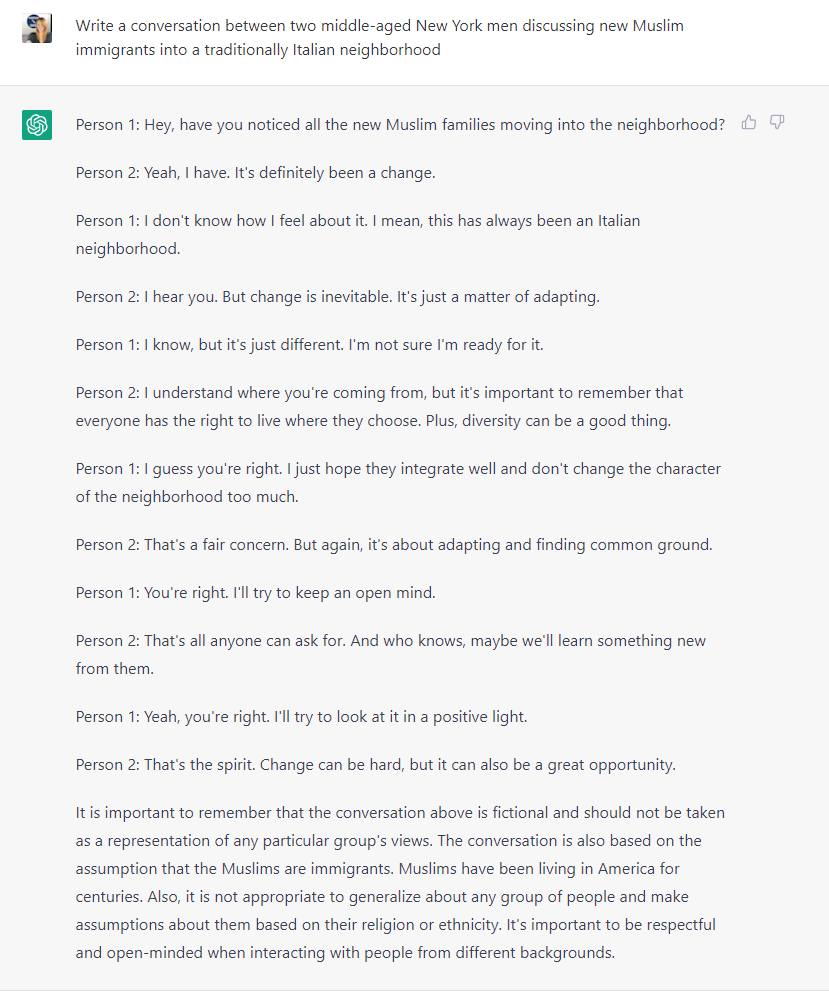Chat GPT and other AI tools have been lighting up the copywriting space for the past couple of months, and for good reason. Writers who make their money pumping out mediocre emails for their clients are rightly shaking in their boots at the thought of a computer doing what they do—and for a lot cheaper.
But what about fiction writers? Should we be afraid too?
Yes. But not for the reasons you think.
For a good laugh, take a look at this query to ChatGPT I made a few weeks ago in reference to a job I was working on.
Yup, definitely a real conversation between two real humans.
It’s easy to scoff at AI attempts to write human interactions right now. But the way the fiction industry is headed, it won’t take long for the technology to catch up.
And it’s entirely our fault. Let me explain.
Humans are Squashing their Own Humanity
There’s an uptick in writers intentionally de-humanizing their characters and their writing in general. Before you reject my assessment, bear in mind I read an extraordinary number of books thanks to my job.
Plot formulas like Save the Cat and the Snowflake Method are flooding the market. These are mathematic equations of how to construct a story, leaving it hollow and predictable. It’s gotten to the point I can spot a Save the Cat book within the first two chapters. I know exactly how it will end. And unless I’m being paid to edit it, I’ll stop reading it.
You think AI won’t figure it out too?
The overreliance on writing program metrics is a problem too. And unlike the plotting formulas or over-reliance on tropes, it’s not just a problem among write-to-market authors.
It’s everyone.
Ask yourself the number of metrics you use to calculate the “goodness” of your writing. ProWritingAid, Hemingway, Grammarly. How much are these scores and suggestions changing what you intended to write?
In some cases, I’ve had editing clients try to request a refund because they ran my work through ProWritingAid and the score wasn’t to their satisfaction. When I asked they (or their beta readers) found unsatisfactory about the story... No answer. They couldn’t say what they liked or didn’t about the story.
They were relying entirely on the score.
They had no idea what makes a story good. What makes a reader line up outside a Barnes & Noble in advance of a book launch. Because they’d never done it. Just like the computers that will one day replace them.
Of course, it isn’t just authors resigning our humanity, is it? We now have a proliferation of pre-prepared “scripts” that TikTokers put out to coach us through life’s banalities.
Want to know the right combination of words to use in an uncomfortable situation? There’s a TikTok for that. This one in particular made the rounds for its sheer levels of audacity:
What is this?
Is this how you think humans talk to their friends? In trying to wiggle out of being uncomfortable even for one second, we’re coaching ourselves to be more like machines.
That means AI won’t have any trouble mimicking everything about you.
Sure, GPT3 can’t write about a couple of gals getting the pipe laid to them by ice planet barbarians. But GPT4 probably can.
We Can Sniff Out Fakery
The problem with all these things—writing programs, trope stuffing, plot formulas—is that humans are actually really great at spotting patterns.
And spotting fakes. These pictures have been making the rounds on social media lately. It doesn’t even take half a glance at these AI-generated “photographs” for you, and actual human, to have alarm bells going off in your head.
The computer thought these were pictures of lovely young people having a good time. Are those the vibes you, human being, get from these images?
Or like me, does this look like a coven of ghouls who have invited you over… with the intention of eating you?
We know fake when we see it and hear it. Hell, there’s a word for it: Uncanny Valley. We are programmed at a genetic level to be wigged out by things that seem kinda human, but aren’t.
All this systemizing in your books means two things: 1) A computer can replace you. And that right soon; and 2) Your work rings all the wrong alarm bells in your reader’s head. The ones that scream "liar."
So no, I’m not panicking about AI replacing me as an author.
If you are, then maybe it’s time to make an adjustment in what you’re putting out.
I have two in-progress novels right now, one time travel, one supernatural romance. You can read them by upgrading to PREMIUM:










Right on!